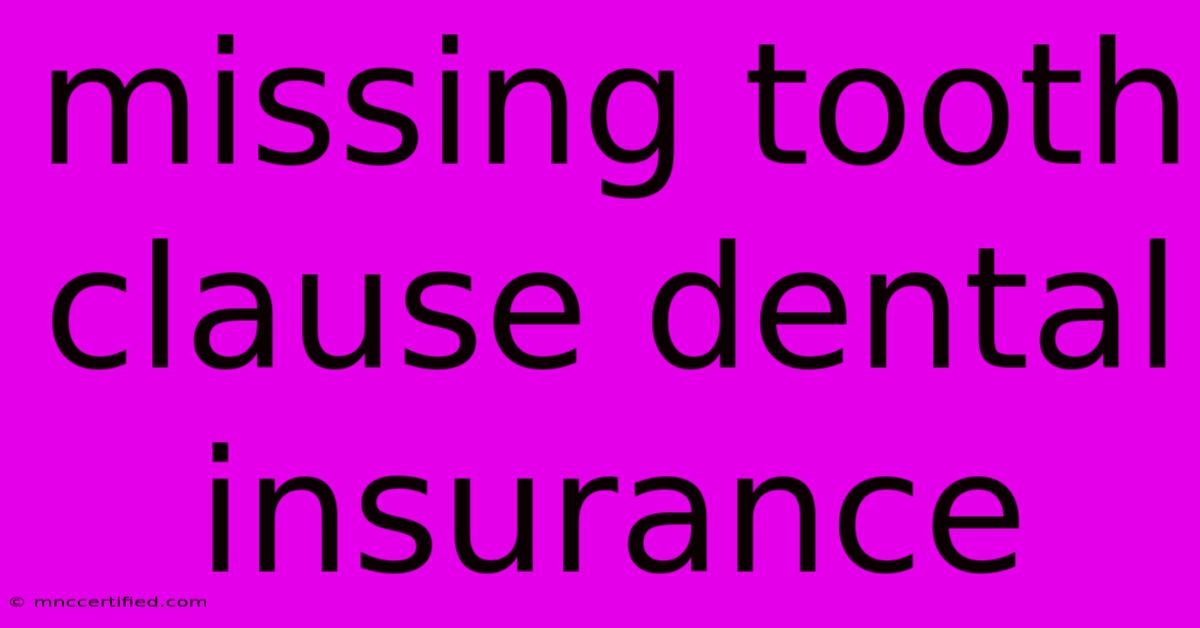Missing Tooth Clause Dental Insurance

Table of Contents
Understanding the Missing Tooth Clause in Dental Insurance
Dental insurance is a valuable asset, providing financial protection for a range of dental procedures. However, it's crucial to understand the specifics of your coverage, particularly regarding the "missing tooth clause," a common provision that can significantly impact your benefits. This clause outlines how your dental insurance plan handles the replacement of missing teeth, and it can be a source of confusion for many policyholders.
What is the Missing Tooth Clause?
The missing tooth clause, often referred to as the "pre-existing condition clause" in dental insurance policies, describes how your insurer handles coverage for replacing teeth that were missing before your policy started. It's designed to prevent individuals from purchasing insurance specifically to cover existing dental issues.
Essentially, this clause often means that your insurance won't cover the full cost of replacing teeth that were lost prior to your policy's inception. This can be particularly relevant for individuals with extensive dental history, such as those who have lost teeth due to accidents, gum disease, or genetic conditions.
Common Scenarios and Coverage Variations
The specific provisions of the missing tooth clause can vary significantly between insurance plans. Here are some common scenarios and how your insurance might handle them:
- Teeth lost due to accident: If you lost a tooth in an accident after your policy started, your insurance likely covers the replacement cost, subject to your plan's limitations.
- Teeth lost due to pre-existing condition: If you lost a tooth before your policy's start date due to a pre-existing condition, such as gum disease or decay, your insurance may only cover a partial cost of replacement, or no coverage at all.
It's vital to carefully review your policy's language to understand the specific coverage for your situation. Some insurance companies offer optional riders or add-ons that can potentially enhance coverage for pre-existing dental issues, including missing teeth.
What to Do if You're Affected by the Missing Tooth Clause
If your policy includes a missing tooth clause, you have several options to consider:
- Negotiate with your dentist: Discuss your situation with your dentist and explore potential financing options or payment plans.
- Seek alternative dental treatments: Explore less expensive options, such as dentures or bridges, which might be more affordable, even with the missing tooth clause limitations.
- Compare insurance plans: Consider switching to a dental insurance plan that doesn't have a strict missing tooth clause or offers better coverage for pre-existing conditions.
The Importance of Understanding Your Coverage
The missing tooth clause highlights the importance of carefully reading and understanding your dental insurance policy before enrolling. It's essential to know the limitations and exclusions, particularly regarding pre-existing conditions, to make informed decisions about your dental care and financial planning.
By understanding the missing tooth clause and its implications, you can ensure that you have the right dental insurance to protect your oral health and manage the cost of dental care effectively.

Thank you for visiting our website wich cover about Missing Tooth Clause Dental Insurance. We hope the information provided has been useful to you. Feel free to contact us if you have any questions or need further assistance. See you next time and dont miss to bookmark.
Featured Posts
-
Ole Miss Te Wright Aims For Hot Streak Vs Georgia
Nov 10, 2024
-
Black Creek Mercantile And Trading Co
Nov 10, 2024
-
How To Invest In Airbnb With No Money
Nov 10, 2024
-
Georgia Vs Ole Miss Live Score Highlights
Nov 10, 2024
-
Chesapeake Life Insurance Dental Plan
Nov 10, 2024